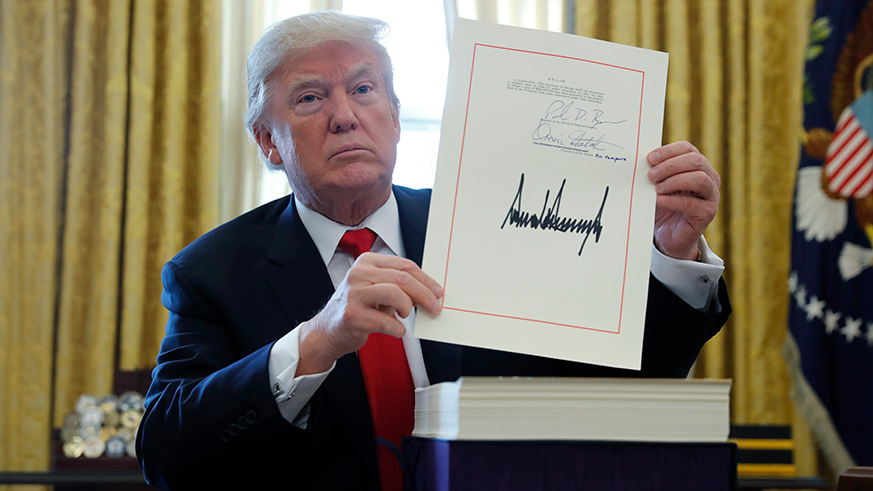WASHINGTON (Reuters) – U.S. President Donald Trump signed Republicans’ massive $1.5 trillion tax overhaul into law on Friday, cementing the biggest legislative victory of his first year in office, and also approved a short-term spending bill that averts a possible government shutdown.
Trump said he wanted to sign the tax bill before leaving Washington on Friday for his Mar-a-Lago estate in Florida, rather than stage a more formal ceremony in January, so he could keep his promise to finish work before Christmas.
“I didn’t want you folks to say I wasn’t keeping my promise. I’m keeping my promise,” he told reporters in the White House.
The two pieces of legislation represent Trump’s most significant accomplishment with Congress since taking office in January, as well as a sign of what awaits when he returns from Florida after the Christmas holiday.
The tax package, the largest such overhaul since the 1980s, slashes the corporate rate from 35 percent to 21 percent and temporarily reduces the tax burden for most individuals as well.
Trump praised several companies that have announced employee bonuses in the wake of the bill’s passage, naming AT&T, Boeing, Wells Fargo, Comcast and Sinclair Broadcast Group.
“Corporations are literally going wild over this,” he said.
Democrats had opposed the bill as a giveaway to the wealthy that would add $1.5 trillion to the $20 trillion national debt during the next decade.
The spending bill extends federal funding through Jan. 19, largely at current levels. It does nothing to resolve broader disputes over immigration, healthcare and military spending.
Republicans also are divided over whether to follow up their sweeping overhaul of the U.S. tax code with a dramatic restructuring of federal benefit programs.
House Speaker Paul Ryan has said he would like to revamp welfare and health programs but Senate Republican Leader Mitch McConnell told National Public Radio on Monday that he was not interested in cutting those programs without Democratic support.
Trump’s year also closes with significant turnover of many top staffers who had been in the White House since early in his term. On Friday, the White House confirmed Deputy Chief of Staff Rick Dearborn and Jeremy Katz, who worked under White House economic adviser Gary Cohn, were leaving.
(Additional reporting by Makini Brice; Writing by Andy Sullivan; Editing by Bill Trott)


















